Driven by Data
Helios Education Foundation has an unwavering belief that education transforms lives and leads to a more prosperous future. We work to ensure all students in Arizona and Florida have access to high quality education and are prepared to succeed beyond high school.
Our commitment to this vision has never changed since Helios was founded nearly two decades ago. What has evolved is our approach to how we work with our partners to drive progress in education. As we saw in 2023, our impact and strategic investments are increasingly driven by data. We use research and analysis to inform our thinking around education issues and seek impactful solutions through strategic partnerships.
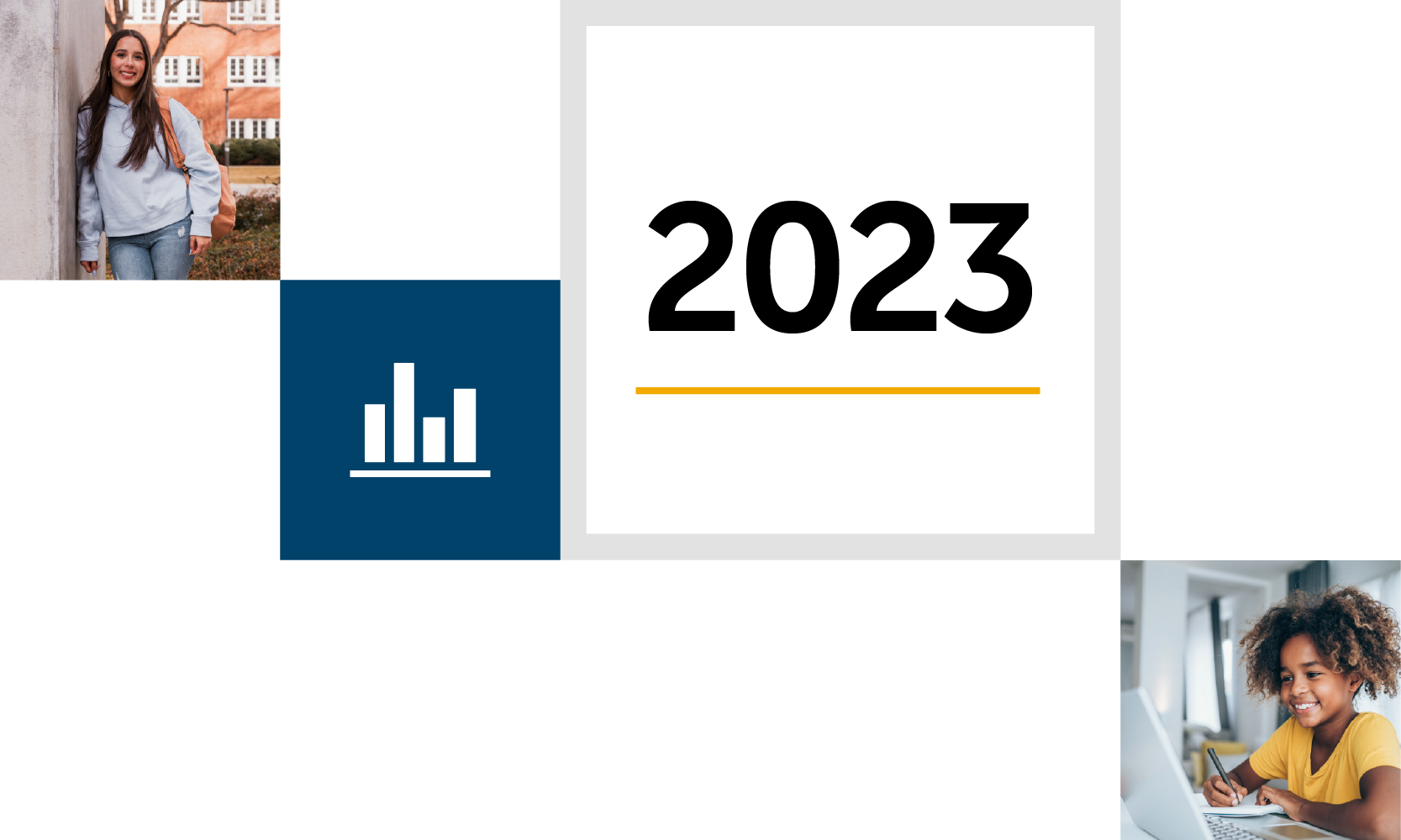
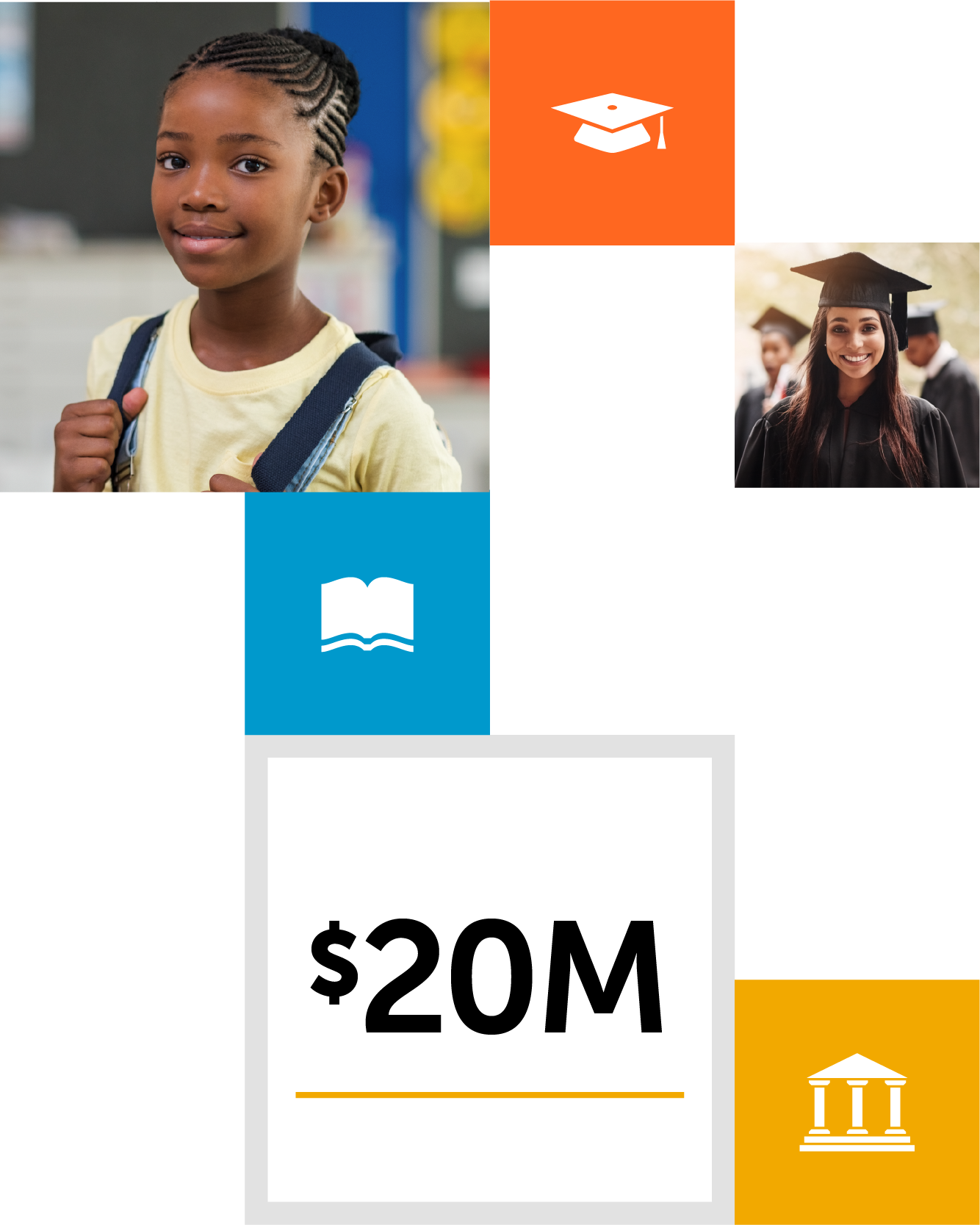
Last year, we invested more than $20 million in three key areas data tells us are essential to fostering student success in education.
In third grade reading, we conducted comprehensive research in Florida outlining actionable strategies and practices to close the gender-based achievement gap at the state, local, and school district levels. In Arizona, we made investments to expand afterschool literacy programs and hosted an Arizona-Florida learning exchange led by two of our partners that produced significant advances in efforts to improve school readiness and early literacy in both states.
In college-going, we celebrated major policy wins with the passage of legislation in Arizona allocating $15.5 million to help expand access to dual enrollment courses and $3.5 million in Florida for dual enrollment teacher training scholarships. Our research in both states reveals dual enrollment and other accelerated courses have a profound impact on students and their chances of going to college.
In postsecondary attainment, our research brief “Billions to Gain: The Economic Benefits of Investing in a More Educated Arizona” quantified the undeniable economic promise of a college education for individuals while showcasing substantial, large-scale economic gains for the state. In Florida, we remained committed to supporting Black students on their postsecondary journey through partnerships and investments in promising solutions to address education achievement gaps.
Now more than ever, data guides us to make informed decisions about how we approach solutions, where we invest, what policy positions we take, and where we can have the greatest impact on students’ lives.
Driven by data, we envision a path forward where all students have the opportunity to succeed in postsecondary education and reach their full potential.
In partnership,


A Year of Impact
Reflecting on 2023, it’s heartening to witness the impact we’ve made alongside our partners. Together, we released research briefs that prove college transforms lives and is a worthwhile investment. We hosted forums in Arizona and Florida to discuss challenges and solutions to issues, like chronic absenteeism and reading proficiency, that our research shows are impacting students the most. And through our investments, we reached nearly 78,000 students and 6,000 educators across the two states we serve.
Explore a few highlights from our year driven by data.

Third Grade Reading

Read Better Be Better
There is an urgent need to improve early literacy in Arizona. Just 41% of third graders in the state are reading at grade level. The rate is even lower for students from low-income backgrounds (27%) and Latino students (30%).
Turning around this literacy crisis is a priority for Helios, as reading proficiently by third grade is foundational to a student’s future academic success.
Read Better Be Better (RBBB) works to improve early literacy outcomes across Arizona with a unique approach that matches third-grade students with middle and high school readers to instill a love of literacy and learning.
A $1.5 million Helios grant is helping scale RBBB’s core third grade program into additional schools. The grant also helps to expand RBBB’s capacity to introduce even earlier reading interventions to kindergarten and first-grade students. As a result, RBBB’s K-1 literacy program is expanding to up to 20 schools across four school districts over the next three years, furthering Helios’ goal that children read at grade level by the end of third grade.
The Gender-Based Achievement Gap in Florida
To address the persistent gender achievement gap in Florida, Helios did a landscape scan of performance disparities between male and female students on the 2021-2022 English Language Arts assessment for the elementary and middle school grades. The research found that while girls in Florida significantly outperform boys in English language proficiency, the gap is greatest among boys in the Black community – only 30% of whom demonstrated ELA proficiency by sixth grade.
The implications of these research findings are far reaching, suggesting that unresolved gender disparities in academic achievement could significantly curtail postsecondary opportunities for individuals and weaken the future of Florida’s workforce.
This work aligns with and advances the recommendations of the Florida Task Force on Closing the Achievement Gap for Boys and emphasizes the importance of grounding education efforts in practices that have demonstrated effectiveness in narrowing the gender-based achievement gap.
To address this critical issue, the research highlights four evidence-based strategies proven to mitigate these disparities. Additionally, the report outlines recommendations at the state, district, and school-level that serve as a crucial roadmap for policymakers, educators, and stakeholders to not only close the gender achievement gap, but also to enhance the educational outcomes and future prospects of all students in Florida.
Transforming Early Literacy Initiative
Black students in Hillsborough County Public Schools are behind their peers in key education metrics, including third grade English Language Arts. When broken down by gender, data show even wider academic achievement gaps exist among boys.
The Transforming Early Literacy Initiative (TELI) is actively working to boost early literacy rates among preschool and kindergarten students to close academic achievement gaps well before third grade.
A collaboration between Hillsborough Education Foundation (HEF) and Hillsborough County Public Schools, TELI is addressing early literacy inequities by improving early educator practices through coaching, mentoring, and learning communities. With the support of a $1.35 million Helios investment, the program is increasing teacher efficacy and showing promising signs of early grade student achievement.
Valley of the Sun United Way
Chronic absenteeism, defined as missing 10% or more of the school year, is linked with diminished academic achievement and an increased likelihood of negative outcomes for students, such as dropping out of high school. Helios research shows the rates of students who are considered chronically absent in Arizona skyrocketed during the pandemic. Recent Helios and nationwide data show this is still a problem.
Chronic absenteeism is one of the top factors affecting third grade reading scores. Valley of the Sun United Way (VSUW) has supported early literacy efforts throughout Maricopa County for more than a decade and was an early supporter of Read On Arizona, a Helios partner and statewide collaborative working to improve language and literacy outcomes for children.
A $475,000 grant from Helios supplements a larger federal grant aiming to reduce chronic absenteeism across Arizona. VSUW, in partnership with Read On Arizona, is using the grant to convene a chronic absenteeism task force and provide training, coaching and mentoring to educators to ensure effective implementation of best practices that reduce or prevent chronic absenteeism. This important work supports Helios’ goal of increasing third grade reading proficiency.
"Helios came in and had a very nice programmatic approach that encourages collaboration with teachers. It encourages our use of data and data analysis. This particular initiative is going to ensure that our kids are proficiently reading by third grade."
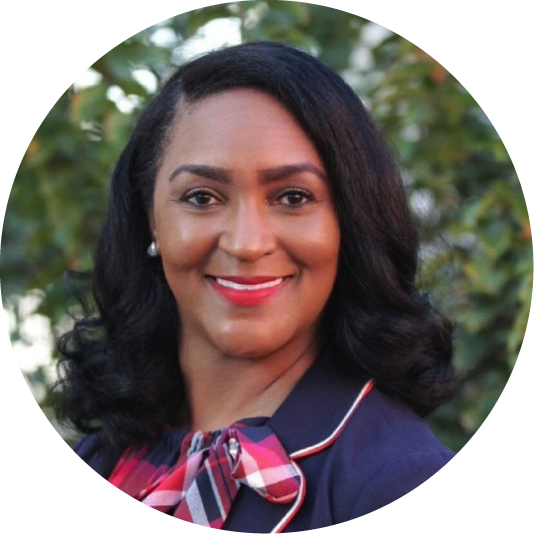
SHAYLIA MCRAE
Deputy Superintendent of Academics and Transformation, Hillsborough County Public Schools

College-Going

Accelerated Coursework in Florida
Helios, along with community partners, has made great strides emphasizing the critical role of accelerated coursework in increasing postsecondary degree attainment in Florida.
Research released by Helios and WestEd in May 2023 shows students in Florida who take at least one AP or dual enrollment course are more likely to enroll in college and complete a degree compared to those who do not enroll in rigorous courses. Notably, while Black students see the greatest postsecondary result from accelerated coursework, they are the least likely to enroll.
The research underscores that by removing barriers to accelerated coursework, we can measurably improve some of the most meaningful education metrics in Florida.
One significant barrier identified is the shortage of certified teachers equipped to lead these courses. In response, Helios played a pivotal role in securing $3.5 million in state funds dedicated to scholarships for dual enrollment teacher training in Florida.
While policies supporting accelerated coursework exist, Helios advocates for stronger adherence and the introduction of incentives for both students and teachers.
Arizona College Connect
Completing the Free Application for Federal Student Aid (FAFSA) is the most important step for college-bound students and their families to obtain a variety of federal and state financial aid. FAFSA completion is also strongly associated with postsecondary enrollment.
And yet, Arizona’s FAFSA completion rates are among the lowest in the country, resulting in students missing out on more than $100 million in Pell Grant funds each year.
With support from a $400,000 grant from Helios, the Arizona Board of Regents (ABOR) developed and launched Arizona College Connect. The challenges created by the recent overhaul of the FAFSA form made this interactive, user-friendly database much more crucial. It provides high school counselors and administrators with access to students’ FAFSA completion data, resources and information. It also helps identify students who may need assistance with the FAFSA form.
Last year, when Arizona College Connect was launched, it achieved an 82% usage rate, and statewide the FAFSA completion rate increased by 5% compared to the prior year. Currently, high schools that capture more than 50% of Arizona high school seniors are signed up as users and most are Title I schools.
The launch of this innovative portal by ABOR supports Helios’ mission to increase college readiness.
Dual Enrollment in Arizona High Schools
Students who take dual enrollment courses that allow them to earn college credit during high school have better postsecondary outcomes than those who don’t.
In fact, findings from a research brief by Helios and the ASU Helios Decision Center for Educational Excellence show students who participate in dual enrollment are more than twice as likely to attend college. They’re also more likely to stay enrolled, earn higher GPAs, and finish. However, access to these courses is not equitable across Arizona.
The research brief helped make the case for $15.5 million approved in the Arizona state budget to help offset the cost of dual enrollment courses for students from low-income backgrounds as well as create incentives for teachers to become dual enrollment certified. In July, Helios hosted a webinar to raise awareness about the new state funding and the dual enrollment research findings.
Helios has also used the research findings to guide investments. In May 2023, we awarded a $950,000 grant to the Greater Phoenix Chamber Foundation’s ElevateEdAZ to help expand access to dual enrollment.
Elevate EdAZ
Helios research shows that high school students who take dual enrollment courses are more than twice as likely to attend college compared to students who don’t. They are also more likely to stay enrolled, earn higher GPAs, and complete their degrees.
Yet, access to the coursework is not equitable. Less than a quarter of Arizona high school students take at least one dual enrollment course before they graduate, while low-income and Latino students have even lower participation rates.
With the support of a $950,000 Helios grant, the Greater Phoenix Chamber Foundation’s ElevateEdAZ program is working to expand dual enrollment offerings, identify and address barriers to dual enrollment participation, and provide incentives for teachers to become dual enrollment certified.
Ongoing ElevateEdAZ strategies have previously shown to boost dual enrollment in school districts by 40 percent.
In 2023, Arizona Governor Katie Hobbs and the Arizona State Legislature appropriated $15.5 million to increase access to, and reduce costs of, dual enrollment courses for students from low-income backgrounds, resulting in a major policy win supported by Helios and the Greater Phoenix Chamber.
Take Stock in Children
For 29 years, the Florida-based nonprofit Take Stock in Children (TSIC) has empowered low-income, at-risk students to break the cycle of poverty through education by providing scholarships, mentors, and hope.
Take Stock in Children provides support services through a volunteer mentor, a college success coach, and college readiness workshops while mitigating financial barriers to higher education by empowering students to earn a Florida Prepaid College Foundation Project STARS scholarship. The TSIC program graduates are automatically enrolled in the Take Stock in College program, where support continues until scholars reach degree attainment or career certification.
The TSIC model has proven successful. More than 92% of TSIC students enroll in college, compared to 50% of non-Take Stock, low-income students. Furthermore, 70% of TSIC students graduate from college, compared to 29% of non-Take Stock, low-income students.
A $1 million, four-year grant from Helios was awarded to support TSIC’s mission to break the cycle of poverty through education. The grant is helping TSIC continue to invest in staff, professional development, and training for 45 affiliates across Florida and broaden technology capabilities for improved data reporting.
Ultimately, Helios’ investment will help ensure TSIC students have access to innovative technology and ongoing support, ensuring their success in college, career, and life.
“Helios is a strong partner, not only from a financial standpoint, but as a thought partner – a partner that is really creating the conditions for this state to take very seriously and very intentionally the need to provide equitable opportunities to all Arizonans to earn a postsecondary degree.”
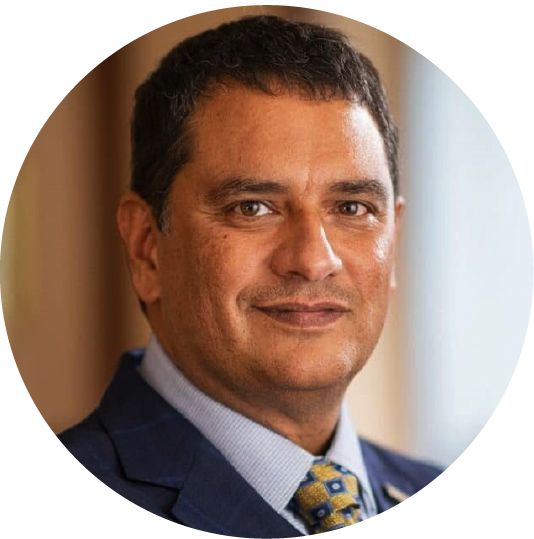
JOSÉ LUIS CRUZ RIVERA
President, Northern Arizona University

Postsecondary Attainment

Az Ahead
Less than half of working-age adults in Arizona hold a college degree, professional certificate, or license. As the state looks to increase postsecondary attainment, the current environment is ripe with opportunities for collaboration among the state’s public colleges and universities.
To advance postsecondary educational attainment in Arizona, the Northern Arizona University Foundation created Az Ahead, previously known as the Arizona College Excellence (ACE) initiative. Az Ahead replicates program elements of the proven Yuma Educational Success (YES) Program for six community colleges. Az Ahead is meant to help community college students persist, transfer to NAU, and graduate prepared for personal and professional success.
A $3.8 million grant from Helios over three years supports this effort, with an anticipated reach of more than 1,000 students. Most of the funds from Helios are going toward scholarships, with the remaining funds supporting additional program staff and wraparound student support services.
The initiative aligns with Helios’ mission to increase college readiness and postsecondary attainment, targeting underserved communities and partnering with tribal colleges.
Billions to Gain: The Economic Benefits of Investing in a More Educated Arizona
At a time when many are questioning the value of a college education, Helios’ Billions to Gain research points to the undeniable economic benefits of college enrollment and competition – for individuals, communities, and Arizona.
Billions to Gain produced by Helios and Education Forward Arizona found that Arizonans with postsecondary education enjoy higher earnings, better health, and more economic opportunities compared to those with only a high school diploma.
This personal prosperity extends to significant economic gains for the state. By boosting college enrollment by just 20%, Arizona could see more than $5 billion in economic benefits.
Billions to Gain was the focus of a Spring 2023 convening at the Helios Education Campus that drew more than 100 educators, business leaders and policymakers. They explored the findings and the actions required to ensure more students graduate high school and pursue a postsecondary education.
HSI EXCELlence Program
Helios continues to make investments to improve Latino student success at the Maricopa County Community College District (MCCCD), one of the biggest community college districts in the nation and a major gateway for first-generation students. While more Latino students are going to college, significant gaps in college graduation still exist between Latino and other students in Arizona.
Helios awarded a $1.85 million grant to the Maricopa Community Colleges Foundation to deliver resources aimed at strengthening educational outcomes that increase postsecondary persistence and completion among Latino students at six of Maricopa Community College’s Hispanic Serving Institutions.
Originally launched in 2014, the HSI EXCELlence program’s findings have shown to improve academic success: EXCEL students consistently have higher year-to-year persistence rates, transfer rates to four-year universities, and degree or certificate completion rates.
Florida Student Success Center
In 2018, with the support of a Helios grant, the Florida College System Foundation established the Florida Student Success Center (FSSC), which works collaboratively with state and community colleges to create statewide strategies for student success, share best practices, and maximize resources to bolster postsecondary completion.
In recent years, the FSSC has made substantial strides in mathematics reform and implementing guided pathways for students, as well as other initiatives that promote student success.
To expand upon the Student Success Center’s existing and new initiatives, Helios made an additional investment of $850,000 to drive the development of purpose-driven workshops around policy and practice topics; to enhance student transfer, enrollment, and retention strategies; to build workforce alignment pathways for students; and to provide evidence-based technical assistance.
FUSE Scholarship 2.0
In 2023, Helios funded another round of scholarships to support the University of South Florida’s (USF) FUSE program with the goal of increasing student transfer success rates from feeder state colleges into USF.
With the help of Helios’ $1.5 million grant to the Community Foundation of Tampa Bay, the administrator of the FUSE scholarship program, 520 new FUSE scholarships will be awarded to eligible, low-income FUSE program participants through 2026. At least half of these new scholarships will directly impact Black students in an effort to close critical equity gaps in bachelor’s degree attainment.
In addition to scholarships, the FUSE program provides students with resources and targeted supports, such as personalized college transfer advisors, priority course registration, workshops, student activities, and guidance for a smooth transition into university.
Transfer Student Success Initiative
In higher education, transfer students often face challenges in completing their degrees within the customary two-year timeframe, grappling with transfer shock, limitations in course transferability, or unmet prerequisites for their chosen major, and financial constraints. Recognizing this critical issue, the Florida Consortium of Metropolitan Universities has taken a pivotal role in increasing the success rates of transfer students across Florida.
At the core of this effort lies the Consortium’s Transfer Student Success initiative, a comprehensive program designed to tackle the primary obstacles hindering seamless transitions from college to university and ensuring timely graduation within two years. The Consortium brings together universities in Florida’s largest urban areas: Florida International University (Miami), the University of Central Florida (Orlando), and the University of South Florida (Tampa). These institutions collectively enroll approximately 64 percent of all Florida College System transfer students, wielding substantial influence in shaping the state’s transfer success rates.
In a significant boost to this initiative, Helios awarded $1.25 million to support the Transfer Student Success Initiative. This funding has empowered the universities to implement data-supported solutions for transfer student success. This includes college life coaching post-transfer, progression stipends to incentivize full-time enrollment, course equivalency and sequencing process improvements, and customized success coach training through partnership with the UCF Higher Education Coaching Academy, which has led to training for Florida Consortium university members (FIU, UCF, and USF) and Florida College System partner college advisors.
ASU Helios Decision Center for Educational Excellence
The ASU Helios Decision Center for Educational Excellence empowers decision makers to improve education outcomes for all Arizona students using a collection of data visualizations and tools presented inside the Helios Decision Theater. In 2023, more than 1,060 people attended the 110 sessions presented.
The Arizona Education and Workforce Visualization is the latest data visualization created. It helps users explore the interaction between Arizona’s economic and educational systems in detail and prompts them to collaborate more effectively to prepare Arizona students and workers for the state’s cutting-edge opportunities.
The ASU Helios Decision Center has also expanded the Personalized Admissions Project, with Arizona’s three state universities and nearly 30 school districts participating in the 2023-2024 school year. Through the program, high school students are sent letters congratulating them for meeting admissions requirements and being accepted to attend one or more of Arizona’s three state universities – before they apply. The ASU Helios Decision Center aims to utilize this program to streamline the college application process for students.
Adding to the accomplishments, the ASU Helios Decision Center was a 2023 recipient of the ASU President’s Medal for Social Embeddedness for its efforts to increase college access and attainment across Arizona.
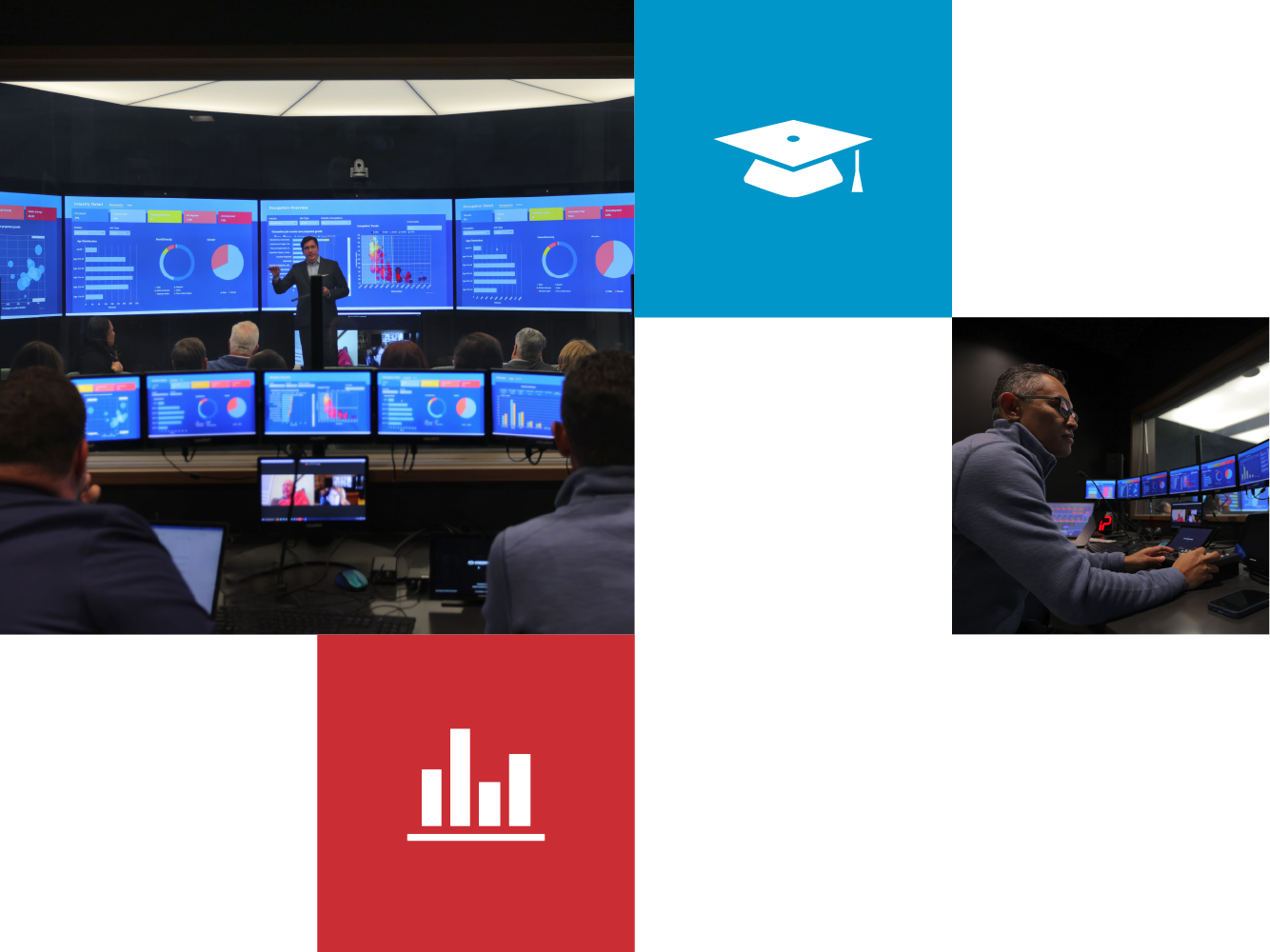
Financial Summary
In Fiscal year 2023 (October 2022-September 2023), Helios Education Foundation made 340 investments totaling more than $20 million.
| # Grants | $ Grants | |
|---|---|---|
| Community Investments Only | 28 | $17,755,000 |
| All Other Charitable | 284 | $2,341,751 |
| Total | 312 | $20,096,751 |
| # Grants | $ Grants | |
|---|---|---|
| Third Grade Reading | 7 | $3,700,000 |
| College-Going | 8 | $3,600,000 |
| Postsecondary Attainment | 13 | $10,455,000 |
| Total | 28 | $17,755,000 |
Helios Education Foundation’s Board of Directors is committed to managing our resources to ensure we strengthen education systems, support partner organizations, and create educational opportunities for students.
We are also committed to managing resources to ensure that Helios will exist in perpetuity.
We manage financial resources and operations under three principles – asset preservation, portfolio growth, and intergenerational equity – to ensure that future generations will benefit from the same level of investment in the community that we provide today.
Our investment strategy and strong financial position are developed under the close guidance and leadership of the Finance Committee and in partnership with the Chief Financial Officer and an independent financial consulting firm.



